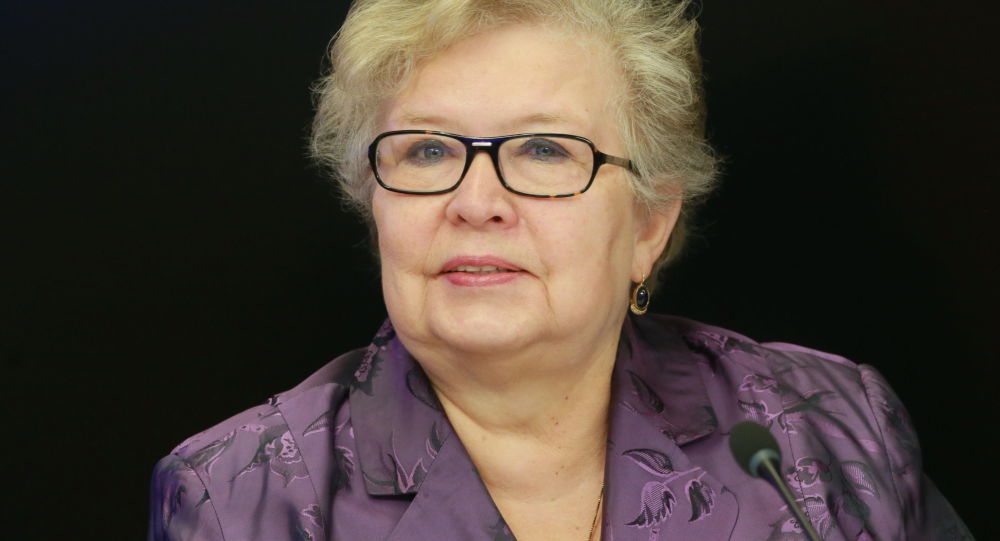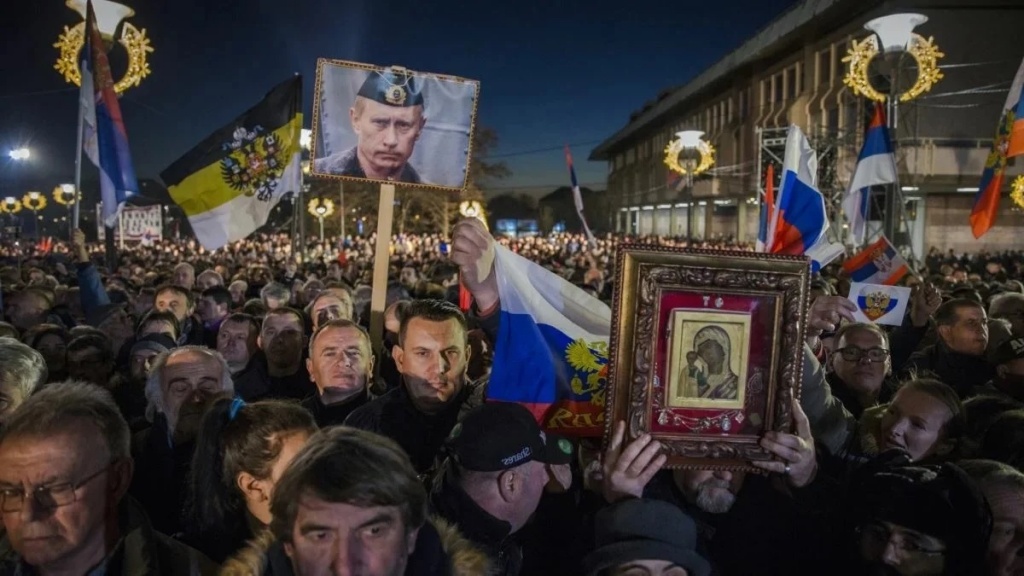
Elena Guskova: About 80% of locals believe that Montenegro has no future without Russia
/ Главная / Russkiy Mir Foundation / Publications / Elena Guskova: About 80% of locals believe that Montenegro has no future without RussiaElena Guskova: About 80% of locals believe that Montenegro has no future without Russia
Svetlana Smetanina

Thousands of Montenegrins celebrated the opposition's victory in the elections. Photo credit: yandex.by
The opposition bloc won at the parliamentary elections held in Montenegro. Its position is considered pro-Serb and pro-Russian. Director of the Center for Contemporary Balkan Crisis Studies of the RAS Institute of Slavic Studies Dr. Elena Guskova believes that if the opposition succeeds in uniting efforts the country's foreign policy can seriously change.
- For the first time in 30 years, the united opposition won the parliamentary elections in Montenegro. And a lot of people came to the elections – the turnout was 76%. What is the reason for such activity of people and the victory of opposition parties?
Speaking about these elections, it is necessary to consider how Milo Djukanovic ruled Montenegro for 30 years. First of all, he greatly worsened relations with Serbia - in fact, the borders were closed. And Montenegrins from Serbia were allowed in for political reasons. And if a person was not convenient for the current government, then he was simply not allowed in. I know at least three people who have filed a lawsuit to have the borders opened and allowed to enter Montenegro.
Secondly, of course, Djukanovic seriously adored the West. He supported the EU sanctions against Russia and, accordingly, seriously worsened relations with Russia. For the Montenegrin people, this was a very negative gesture of the head of state, because Montenegrins, starting from the 18th century, lived with the thought that Russia thought about them, and that they lived only thanks to the help of first the Russian Tsar, and then the USSR and Russia.
But the most important blow to the people was the law on the church - the "Law on Freedom of Religion." Raising his hand against the Serbian Orthodox Church in Montenegro, Djukanovic signed his own sentence.
All these reasons forced the people to rise and take to the streets even during the pandemic. Naturally, everyone expected the opposition to seriously prepare for these elections. The fact is that it has been taking to the streets for several years. And if two years ago the police actively beat up the protesters and imprisoned them, now the protests were so massive that no police could stop them. Therefore, before the elections, everything very much depended on how the opposition could unite.

Elena Guskova
Background
In the autumn of 2016 - in the spring of 2017, massive protests against the country's entrance to NATO took place in Montenegro, in which up to 30,000 people took part. Police violently dispersed demonstrators using truncheons and tear gas. Information about the rallies was blocked in the official media, and the leading European media resources also pretended not to notice the massive protests in the Balkan country. Therefore, it turned out to be an unpleasant surprise for NATO Secretary General Jens Stoltenberg that instead of flowers and applause at the Podgorica airport, he was greeted with the Russian Katyusha song and "No NATO" posters. The opposition demanded a nationwide referendum on joining NATO, but the authorities did not take this step, realizing that they would lose. All opinion polls showed that 64% of the country's population was against joining the NATO, and 85% were in favor of holding a referendum on this issue.
The election results are good enough: if the opposition parties unite in the Assembly, they will receive more than 50% of the seats in parliament. Djukanovic and his party will have about 30 seats, and the opposition will have 41 out of 81. There will be a difference of 10 votes between them. Now the main task of the opposition is to unite and act as a united front, which is the most difficult thing for Montenegrins and Serbs.

Demonstration of believers in Montenegro. Photo credit: zen.yandex.ru
And the second task is to try to prevent Djukanovic from adding ten more places to his 30 places. These seats went to national minorities - Muslims and Albanians, as well as two small social democratic parties.
If Djukanovic's party succeeds in gaining ten more seats, then there will be almost equal votes, which will greatly complicate the work of parliament. But now the most important thing is that Djukanovic does not have a majority in the Assembly.
Djukanovic himself is optimistic about the election results. He, I think, gave his best to the full by using the stuffing of ballots, inaccurate data, and floating voters. About 600 cases of violations were recorded in these parliamentary elections.
Therefore, we are now looking with optimism at what is happening. The main opposition force "For the Future of Montenegro" has already announced that they will change their policy towards Serbia and Russia. Therefore, there are high hopes for improving relations with Russia.
- Having adopted the Law on Freedom of Religion, Djukanovic was going to follow the Ukrainian path of dividing the Orthodox Church?
- Through this law, he wanted to destroy the Serbian Orthodox Church, taking away all property from it - churches, lands, parishes - and transfer them to the newly formed Montenegrin Church. At one time, he also created a parallel Academy of Sciences, because the real Academy of Sciences, which was created during the days of socialist Yugoslavia, did not support him. But he did not succeed, although the new academy existed for several years. It was through such "reforms", including the church, that he tried to stay in power.
- And what is the attitude of the people of Montenegro to Russia today? Do you have survey data?
- Yes, there is such data. About 80% of Montenegrins believe that Montenegro has no future without Russia. Russia has no big ties to Montenegro - well, other than the fact that our people bought land and real estate there. But Montenegro itself needs Russia much more. Now there will be a question about NATO membership. If the opposition seriously takes power into their own hands, I think it will come to a revision of Montenegro's membership in the North Atlantic Alliance. But this is not immediately and not now. First, they will have a serious internal political struggle.
- Is Milo Djukanovic still the president?
- The president is elected there for a period of five years; two years have passed since the last presidential elections. Some political observers in Montenegro believe that in such a political situation in parliament, when he is unable to carry out his decisions, Djukanovic will resign. But I do not agree with this, I think that he will fight to the end because he risks losing his freedom without power.
New publications

 Mikhail Kalatozov, a director who transformed the world of cinematography in many ways, was born 120 years ago. He was a Soviet film official and a propagandist. Above all, he was capable of producing movies that struck viewers with their power and poetic language.
Mikhail Kalatozov, a director who transformed the world of cinematography in many ways, was born 120 years ago. He was a Soviet film official and a propagandist. Above all, he was capable of producing movies that struck viewers with their power and poetic language.  Ukrainian authorities have launched a persecution campaign against the canonical Ukrainian Orthodox Church (UOC), the biggest one in the country's modern history. Over the past year, state sanctions were imposed on clergy representatives, searches were conducted in churches, clergymen were arrested, criminal cases were initiated, the activity of the UOC was banned in various regions of the country, and monasteries and churches were seized.
Ukrainian authorities have launched a persecution campaign against the canonical Ukrainian Orthodox Church (UOC), the biggest one in the country's modern history. Over the past year, state sanctions were imposed on clergy representatives, searches were conducted in churches, clergymen were arrested, criminal cases were initiated, the activity of the UOC was banned in various regions of the country, and monasteries and churches were seized.  When Nektary Kotlyaroff, a fourth-generation Russian Australian and founder of the Russian Orthodox Choir in Sydney, first visited Russia, the first person he spoke to was a cab driver at the airport. Having heard that Nektariy's ancestors left Russia more than 100 years ago, the driver was astonished, "How come you haven't forgotten the Russian language?" Nektary Kotlyaroff repeated his answer in an interview with the Russkiy Mir. His affinity to the Orthodox Church (many of his ancestors and relatives were priests) and the traditions of a large Russian family brought from Russia helped him to preserve the Russian language.
When Nektary Kotlyaroff, a fourth-generation Russian Australian and founder of the Russian Orthodox Choir in Sydney, first visited Russia, the first person he spoke to was a cab driver at the airport. Having heard that Nektariy's ancestors left Russia more than 100 years ago, the driver was astonished, "How come you haven't forgotten the Russian language?" Nektary Kotlyaroff repeated his answer in an interview with the Russkiy Mir. His affinity to the Orthodox Church (many of his ancestors and relatives were priests) and the traditions of a large Russian family brought from Russia helped him to preserve the Russian language.

 The leaders of the Friends of the Great Russia cultural association (Amici Della Grande Russia) in Italy believe that the Western policy of abolishing Russian culture in Europe has finally failed. Furthermore, it was doomed to failure from the beginning.
The leaders of the Friends of the Great Russia cultural association (Amici Della Grande Russia) in Italy believe that the Western policy of abolishing Russian culture in Europe has finally failed. Furthermore, it was doomed to failure from the beginning.  Name of Vladimir Nemirovich-Danchenko is inscribed in the history of Russian theater along with Konstantin Stanislavski, the other founding father of the Moscow Art Theater. Nevertheless, Mr. Nemirovich-Danchenko was a renowned writer, playwright, and theater teacher even before their famous meeting in the Slavic Bazaar restaurant. Furthermore, it was Mr. Nemirovich-Danchenko who came up with the idea of establishing a new "people's" theater believing that the theater could become a "department of public education."
Name of Vladimir Nemirovich-Danchenko is inscribed in the history of Russian theater along with Konstantin Stanislavski, the other founding father of the Moscow Art Theater. Nevertheless, Mr. Nemirovich-Danchenko was a renowned writer, playwright, and theater teacher even before their famous meeting in the Slavic Bazaar restaurant. Furthermore, it was Mr. Nemirovich-Danchenko who came up with the idea of establishing a new "people's" theater believing that the theater could become a "department of public education."  "Russia is a thing of which the intellect cannot conceive..." by Fyodor Tyutchev are famous among Russians at least. December marks the 220th anniversary of the poet's birth. Yet, he never considered poetry to be his life's mission and was preoccupied with matters of a global scale. Mr.Tyutchev fought his war focusing on relations between Russia and the West, the origins of mutual misunderstanding, and the origins of Russophobia. When you read his works today, it feels as though he saw things coming in a crystal ball...
"Russia is a thing of which the intellect cannot conceive..." by Fyodor Tyutchev are famous among Russians at least. December marks the 220th anniversary of the poet's birth. Yet, he never considered poetry to be his life's mission and was preoccupied with matters of a global scale. Mr.Tyutchev fought his war focusing on relations between Russia and the West, the origins of mutual misunderstanding, and the origins of Russophobia. When you read his works today, it feels as though he saw things coming in a crystal ball...